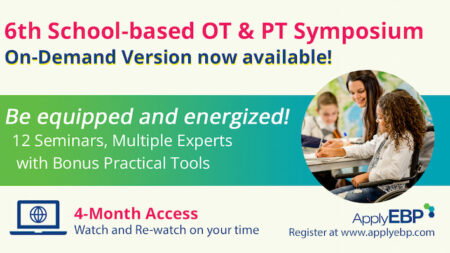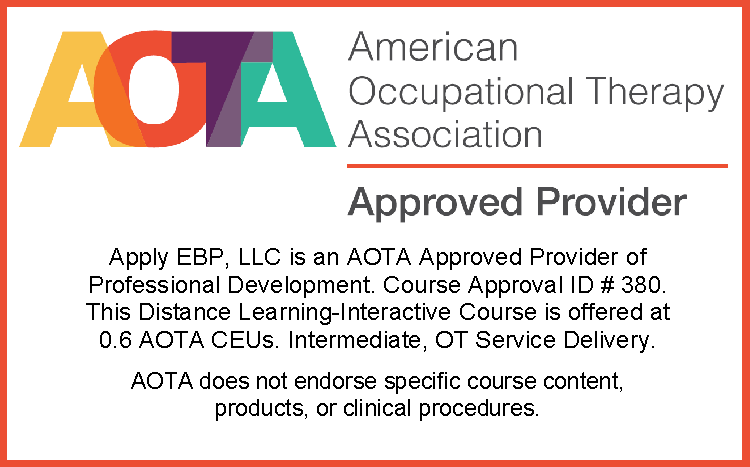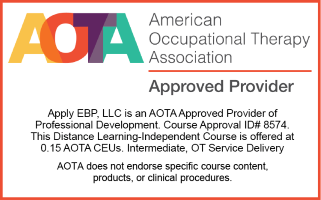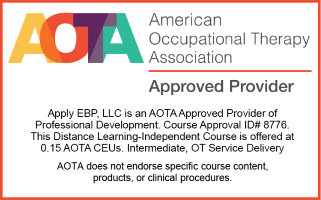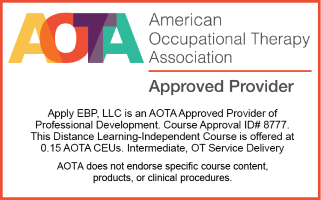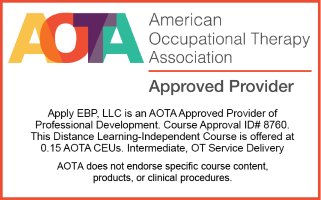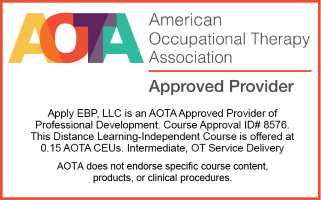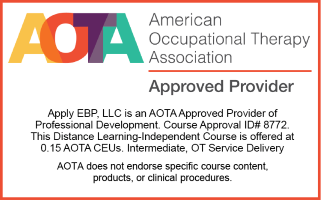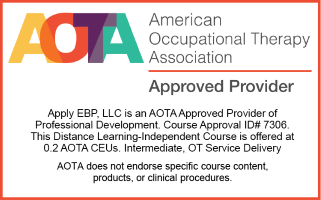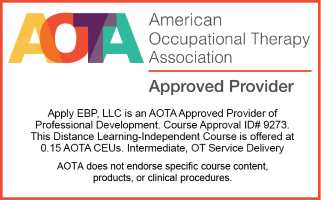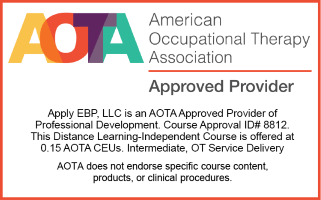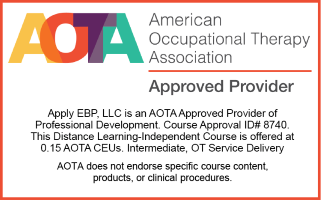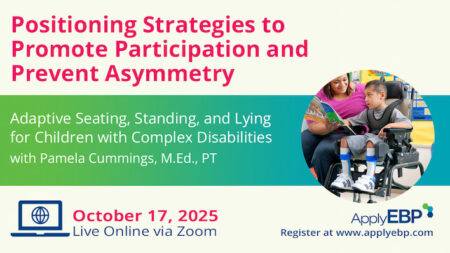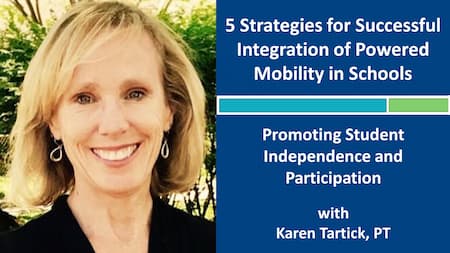6th Online School-based OT and PT Symposium
On-Demand Version
4-Month Access
- Watch and re-watch on your own time
- On-Demand Version
Be equipped and energized! Now available in On-Demand Format.
This Symposium will provide you with practical application of the current evidence & hottest topics in school-based practice. This is the essential course for every school-based OT & PT – whether you’re new to the practice, or you’re an experienced therapist seeking more ideas! The Symposium consists of multiple seminar topics including ADHD, Dyslexia, Cerebral palsy, DCD and autism, collaborative goals, screening process, PT strategies for MTSS, Universal Design for Learning as a therapy tool, creating a life skills program, embedding OT services, explaining school-based versus medical-based OT/PT services, and positioning via wheelchair, adapted seating, and supported standing. Download the Brochure for more details about each seminar.
Come and learn from the leading experts in the fields of school-based and pediatric practice, and leave the course with your Bonus Practical Tools that you can use the very next day!
Symposium Sponsor
The ability to offer all 12 sessions from the live symposium is brought to you by our partnership with Rifton, Inc. Note that by purchasing the course, you are agreeing to share your contact information with Rifton, Inc.
Adiaha Spinks-Franklin, MD, MPH, FAAP is a board certified Developmental-Behavioral Pediatrician. She has more than 20 years’ experience in caring for children and adolescents with developmental disabilities and behavior disorders, and in training pediatric health care professionals in the US and abroad. She holds leadership positions in many national pediatric professional organizations. She identifies as Wonder Woman.
Peggy Morris, OTD, OTR/L, BCP is an occupational therapist with 30+ years of experience in pediatric practice. She has worked in early intervention, private practice, and out-patient pediatric rehabilitation services, but most of her experience and passion is in school-based practice. She is Board Certified in Pediatrics (BCP) through the American Occupational Therapy Association (AOTA), and reviews initial and renewal applications in the BCP for AOTA. She currently teaches graduate students in the occupational therapy department at Tufts University.
Carlo Vialu, PT, MBA served as Director of Physical Therapy for the NYC Department of Education, where he oversaw a program with over 700 PTs working in more than 1,500 schools. He is project manager of research on normative data for five mobility tests for school-aged children, & co-founder of www.SeekFreaks.com.
Karen Tartick, PT has been practicing for over 30 years in a variety of settings including outpatient orthopedics, early intervention, acute care, NICU, and school-based physical therapy. She currently practices as a physical therapy consultant for autistic adults.
Pamela Cummings, M.Ed., PT has over 30 years of experience in various areas of pediatric physical therapy: school-based, home-based, perinatal care, NICU, PICU, inpatient, and clinic-based. She is the Director and PT Consultant for the I-Team Early Intervention Project and the 24-Hour Postural Care Project, supporting local providers in their work with children and young adults with motor disorders.
Lara Collins Barros, OTD, OTR/L has been a school-based OT for over 25 years. She discovered the CO-OP Approach while completing her OTD at NYU and has never looked back. She had the privilege to develop “A Guide for Implementation: Using the Principles of CO-OP to Frame a Top-Down Approach with School-Aged Children” with the mentorship of Dr. Helene Polatajko of ICAN CO-OP.
Pam Stephenson, OTD, OTR/L, BCP, FAOTA has enjoyed working in various interprofessional teams across pediatric settings, including in schools and in early intervention, as well as in adult settings. Pam is the past Chairperson of the AOTA’s Children and Youth Special Interest Section (CYSIS). She currently teaches at Mary Baldwin University in Fishersville, VA.
Anne Kiraly-Alvarez OTD, OTR/L, SCSS is the program director of the OT Program at Midwestern University in IL. She has worked as an OT primarily with children, adolescents, and young adults in school-based settings.
Priscila Tamplain, PhD is an associate professor at the Department of Kinesiology at the University of Texas at Arlington. She is an expert and researcher on the topics of motor development and Developmental Coordination Disorder (DCD).
Patti Sharp, OTD, MS, OTR/L is a certified CO-OP Instructor, and OT at Cincinnati Children’s Hospital Medical Center (CCHMC). She co-leads the DCD Community of Practice at CCHMC. She is excited to share her passion for EBPs with her therapy colleagues.
Disclosures: Peggy, Carlo, Karen, Adiaha, Anne, Priscila, Patti, Lara, Pam Cummings, and Pam Stephenson receive speaking fees from Apply EBP, LLC. They have no relevant nonfinancial relationships to disclose. Carlo is the co-owner of Apply EBP, LLC.
At the completion of each seminar, you will be able to:*
-
-
- Identify 2 potential benefits of creating collaborative student goals in school-based practice
- Apply 3 strategies to facilitate the collaborative development of student-centered goals in a given case study of a student with disabilities
- Determine 2 opportunities for collaborative goals within various contexts of a student’s school function and participation
- Select 3 guiding principles for an effective screening process that supports the student’s academics and school participation
- Apply the steps of a collaborative screening process on given case scenarios
- Determine when screening should result in implementation of strategies in class or a full evaluation of the student
- Select the 3 brain networks targeted by UDL Guidelines
- Identify the role of related service providers in the implementation of UDL Guidelines to enhance a student’s access to and participation in their education
- Apply 3 practical strategies that related service providers can provide to promote multiple means of engagement, representation, action, and expression in given case scenarios of students with and without disabilities
- Identify the role of school-based PT practitioners in MTSS implementation
- Select 3 benefits of a PT practitioner’s participation in MTSS
- Determine 3 strategies that PT practitioners can utilize to contribute to various levels of MTSS that can promote students’ successful participation in their education
- Select 3 reasons for providing embedded services to improve a student’s performance and participation in the school environment
- Distinguish the importance of each of the 3 steps of embedding: observing, hypothesizing, and intervening
- Apply 3 evidence-based occupational therapy interventions in an embedded manner on a given case study of a student with disabilities
- Identify 3 primary symptoms of cerebral palsy that impact your pediatric client’s motor performance
- Determine 3 features of effective, evidence-supported interventions for children with cerebral palsy
- Apply 3 strategies to facilitate achievement of functional goals for children with cerebral palsy in the school, home, or community environment on a given case study
- Identify 3 roles of OT, PT, and Speech practitioners in developing and implementing a life skills program
- Select 2 tools and strategies for identifying the needs for a life skills program within a school/district
- Apply 3 strategies to a case example that OT, PT, or Speech practitioners can use to develop a life skills program
- Identify 2 ways a 24-Hour Postural Care can help promote school participation
- Select 3 assessment tools for measuring needs and outcomes in daytime positioning
- Apply 3 considerations for choosing the components of adapted seating and supported standing equipment to match the functional needs of a student in a given case study
- Select the correct definition of dyslexia
- Identify 3 warning signs of dyslexia
- Select the 5 components of reading that are addressed by evidence-based curricular interventions for dyslexia
- Determine 3 strategies OT and Speech practitioners can utilize to contribute to the learning of students with dyslexia
- Select 2 assessment tools to identify motor difficulties in autistic children
- Identify 3 characteristics that distinguishes the 3 profiles of motor abilities/difficulties in autistic children
- Apply 3 evidence-based strategies for improving motor skills in DCD on a given case scenario of an autistic child
- Identify the 3 core symptoms of ADHD
- Determine 3 ways executive functioning disorder may affect the client’s behaviors during therapy provision for pediatric clients with ADHD
- Apply 3 strategies for managing executive dysfunction on a given case study of a pediatric client with ADHD
- Identify 3 differences between school-based and medical-based OT, PT and Speech services
- Determine 3 strategies for explaining the role of school-based OT, PT and Speech services in promoting a student’s access and participation in their education
- Determine 3 opportunities for explaining the role of school-based OT, PT and Speech service providers to other IEP team members
-
*Depending on the seminars you complete
Here are the 12 included seminars. For a full description of each seminar please download the Brochure.
-
-
-
- Seminar 1: 5 Steps of Collaborative Goal Writing: Strategies for Related Service Providers and Educators | Pam Stephenson, OTD, OTR/L, BCP, FAOTA | For OT/As & PT/As
- Seminar 2: Screening for a Student’s Need for School-based Services: The 6-Step Screening Process & Decision-Making | Karen Tartick, PT | For OT/As & PT/As
- Seminar 3: Universal Design for Learning (UDL) as a Therapy Tool: Role of Related Service Providers in Promoting Access in Education | Peggy Morris, OTD, OTR/L, BCP | For OT/As
- Seminar 4: Functional Interventions for Children with Cerebral Palsy: 5 Key Strategies that Work! with Patti Sharp, OTD, OTR/L, BCP | For OT/As & PT/As
- Seminar 5: 3 Steps to Successful Embedding of OT Services: Plus Real-life Case Study Applications | Lara Collins Barros, OTD, OTR/L | For OT/As
- Seminar 6: PT Strategies for Multi-tiered System of Supports (MTSS): Promoting Inclusion Across School Settings | Karen Tartick, PT | For PT/As
- Seminar 7: 4 Steps of Implementing a Successful Life Skills Program: The Role of OT, PT, & Speech Providers in Meeting Students’ Functional Needs | Anne Kiraly-Alvarez, OTD, OTR/L, SCSS | For OT/As & PT/As
- Seminar 8:Positioning Strategies to Promote School Participation: Adapted Seating and Standing for Students with Complex Disabilities | Pamela Cummings, M.Ed., PT | For OT/As & PT/As
- Seminar 9: Dyslexia: Warning Signs, Diagnosis, and What Works! And Role of OT and Speech Services | Adiaha Spinks-Franklin, MD, MPH, FAAP | For OT/As
- Seminar 10: Developmental Coordination Disorder in Autism: Identifying Motor Difficulties in Autistic Children and Youth | Priscila Tamplain, PhD | For OT/As & PT/As
- Seminar 11: Boosting Impact of OT, PT, and Speech Services for Children with ADHD: Proven Strategies to Incorporate into Your Interventions | Adiaha Spinks-Franklin, MD, MPH, FAAP | For OT/As & PT/As
- Seminar 12: Explaining School-based versus Medical-based OT and PT Services | Carlo Vialu, PT, MBA | For OT/As & PT/As
-
-
To help you apply what you learned the very next day you return to work, you will leave the course with your The Well-Equipped Therapist! Practical Toolkit, which may include Cheat Sheets, Clinical Reasoning Worksheets and/or Resources for each of the seminars you complete.
-
-
-
- Seminar 1: 5 Steps of Collaborative Goal Writing – Worksheet: 5 Steps of Collaborative Goal Writing; Resources: Websites and Must-Reads
- Seminar 2: Screening for a Student’s Need for School-based Services – OT and PT Referral and Screening Form
- Seminar 3: Universal Design for Learning (UDL) as a Therapy Tool – UDL as a Therapy Tool Cheat Sheet: 3 Steps of Applying UDL in MTSS; 4 Steps of Applying UDL in Embedded services; Resources: Websites and Must-Reads
- Seminar 4: Functional Interventions for Children with Cerebral Palsy – 5 Strategies that Work; Resources: Websites and Must-Reads
- Seminar 5: 3 Steps to Successful Embedding of OT Services – Cheat Sheet: 3 Steps to Successful Embedding of OT Services; Resources: Websites and Must-Reads
- Seminar 6: PT Strategies for Multi-tiered System of Supports (MTSS) – Cheat Sheet: PT Strategies for MTSS; Resources: Websites and Must-Reads
- Seminar 7: 4 Steps of Implementing a Successful Life Skills Program – Cheat Sheet: 4 Steps of a Successful Life Skills Program; Resources: Assessment Tools, Websites, and Must-Reads
- Seminar 8:Positioning Strategies to Promote School Participation: Adapted Seating and Standing for Students with Complex Disabilities – Graphics: 24-Hour Postural Care (24PC) Pathway; 24PC Resources; Equipment Inventory Checklist; Routines Table
- Seminar 9: Dyslexia: Warning Signs, Diagnosis, and What Works! – Adiaha’s Model of Executive Functions; Dyslexia Resources: Websites and Must-Reads
- Seminar 10: Developmental Coordination Disorder in Autism: Identifying Motor Difficulties in Autistic Children and Youth – Flowchart: 3 Profiles of Motor Abilities/Difficulties in Autistic Children; Resources and Links to Assessment Tools
- Seminar 11: Boosting Impact of OT, PT, and Speech Services for Children with ADHD – Adiaha’s Model of Executive Functions; Executive Functions Domains Cheat Sheet; Executive Functions Management Strategies in ADHD Cheat Sheet; Executive Functions Observations and Management Worksheet
- Seminar 12: Explaining Medical-based versus School-based OT and PT Services under IDEA – School-based vs Medical-based Services Slide Deck for presentations; School Newsletters; Start-of-the-Year Parent Introduction Letter; Evaluation Template; Links to Assessment Tools; and other Resources
-
-
For OTs and OTAs
-
-
-
- Apply EBP, LLC is an AOTA-approved provider of CEUs. You will receive AOTA CEUs for each seminar targeting OT/As that you complete. This includes watching the full video, passing the post-test (with a score of 70% or higher), and completing the course evaluation (see imprimaturs below). You can receive up to 1.7 AOTA CEUs if you complete all seminars targeting OT/As.
-
-
For PTs and PTAs
-
-
-
- You will receive a certificate indicating continuing education hours for each seminar targeting PT/As that you complete. This includes watching the full video, passing the post-test (with a score of 70% or higher), and completing the course evaluation. You can receive up to 14 continuing education hours of training if you complete all seminars targeting PT/As.
- Apply EBP, LLC is an approved provider of CEUs for PTs and PTAs in IL, NM, NY, OK, and TX (APS #: 2703055TX).
- Seminars included that targets PT/As are approved in CA.
- The symposium is approved for up to 12 CE hours in AR, MD (12 hours thru 2/29/28), OH (#24S1046, up to 12 hours thru 4/11/2025), and SC (1.2 CEUs, Approval #CEUL133074 thru 3/31/25). Email Vicki at vicki@applyebp.com after you complete 12 hours for your AR/MD/OH/SC-specific certificate.
- The symposium is approved for up to 10 CE hours in NJ (upto 10 CEUs, Approval #2405-23, thru 1/31/2026).
- The symposium is approved for up to 14 CE hours in MN (#11307 thru 8/31/2025). Email Vicki at vicki@applyebp.com after you complete 14 hours for your MN-specific certificate.
- These PT state boards accept approval by other states boards, associations, and AOTA: AK, AZ, DE, FL, HI, IN, KS, KY, MA, MI, MT, NC, ND, OR, PA, RI, SD, TN, UT, VT, VA, WI, WY, and DC.
- These states do not require pre-approval of courses or have no CE requirements: AL, CO, CT, GA, IA, ID, ME, MO, NE, NH, and WA.
-
-
If you would like to obtain CEUs for another state, please email carlo@applyebp.com
Ticket Prices and Discounts
-
-
- Group: $399/person* – save $50/person if 3 or more from the same organization, community group/network or study group register.
- Individual: $449/person
-
*If you make the mistake of registering with the group discount, but you are not part of a group, we will send you an invoice for the $50 difference. Your access will be suspended until payment of the difference.
Purchasing Tickets
Select on the ticket type below. Enter required information.
-
-
- Individual Ticket:
- Paying with a Credit Card: Click here to register instantly.
- Paying via PO and/or using a tax-exempt certificate: Email vicki@applyebp.com.
- Group Ticket: Email vicki@applyebp.com. You can pay via credit card or PO.
- Individual Ticket:
-
Cancellation Policy
You will have access to this course for 4 months. There is no cancellation once course is purchased. Please email us if you have any questions.
Accommodation Request
Email or call with your request prior to registration.
Complaints Resolution
We welcome all feedback. Please email applyebp@gmail.com if you have any complaints so that we may work with you towards a resolution.
On-Demand Webinars: Watch and Re-watch on your own time
Upon receipt of credit card payment or purchase order (PO), Vicki will send you instructions to access the symposium webinars. Please add vicki@applyebp.com to your Address Book/Safe Senders List to ensure that you receive her email. (See details for payment in Price and Payment Options above.)
Choose a Pricing Option
Price indicated is per person. Select the quantity or number of persons registering for the course.*
*Paying via PO and/or using a tax-exempt certificate: Email vicki@applyebp.com.
Testimonial
“I really enjoyed it. It had great realistic information for our daily practice. Well organized. One of the best symposiums I’ve been to!”– OT with 12 years experience, on the live version on April 11-12, 2024
“I have attended many school based symposiums and this course was by far the best. All presenters made things applicable to schools and provided free resources. I will be back next year!” – PT with 13 years experience, on the live version on April 11-12, 2024
You may also be interested in...
Upcoming Live Workshop
Positioning Strategies to Promote Participation and Prevent Asymmetry
- October 17, 2025, 8:30 am - 3:30 pm Eastern Time
- Online via Zoom
- OTs, OTAs, PTs, PTAs & Educators
- $199-249

